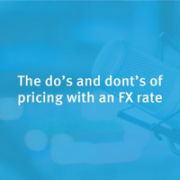MANAGING MARKET PRICE RISKS OUTSIDE OF PURCHASE CONTRACTS
|4-4-2017 | Sjoerd Schneider |

As commodity prices have become more volatile over the past decade, many procurement departments have been feeling the need to somehow manage market price risks. The most frequently used strategy to mitigate commodity price risks by such departments is using physical purchase contracts: fixing prices over a long term horizon. However, there are more subtle and dynamic ways to manage price risks, which can lead to significant savings and tactical advantages. These can be achieved when dedicated market price specialists get involved.
Market price risks
Product specialists and buyers are well aware of all specifics concerning their products but are often not skilled in managing market price risks. Nevertheless it often happens that they are the ones in charge of mitigating market price risks in the form of negotiating the pricing paragraphs within purchase contracts.
There are several reasons why having buyers in charge of mitigating price risks merely through purchase contracts is not optimal:
- Buyers often don’t have the expertise to assess whether the premium charged for fixing prices is decent
- Buyers don’t have the right overview of company-wide commodity risks. When one buyer micro manages his exposures within purchase contracts that does not mean overall risks are managed optimally
- The counterparty in a physical deal might know that the buyer doesn’t have other means of fixing prices. This leads to a weakened negotiating position regarding the overall contract.
Mitigate FX risk
To draw the parallel to a traditional treasury issue: when a European company is a buyer of American machinery and services, would it be the buyer fixing the USD rate with the suppliers’ sales team for just that deal? That would not be the optimal strategy to mitigate FX risk. Hence the same counts for commodity price risks. Hedging through the supplier (let alone by the buyer) should never be the only available option. Literally having more options on the table to mitigate price risks than just asking suppliers for long term fixed prices gives substantial benefits:
- Flexibility:
- being able to hedge at any moment, without having to request or consult the supplier
- after a price decrease it might be interesting to fix prices for a much longer term than purchase contracts usually stretch
- Savings:
- not paying too much premium to the supplier for executing hedges or for taking over price risks
- having a larger pool of potential suppliers as there is no longer a requirement for them to sell at fixed prices
Conclusion
Companies of any size should investigate how large their potential savings could be and how much the increased flexibility will help them. The advantages should outweigh the time and manpower that need to be invested.

Founder of Insposure
More articles from this author:
Commodity price risks deserve a spot within treasury management










